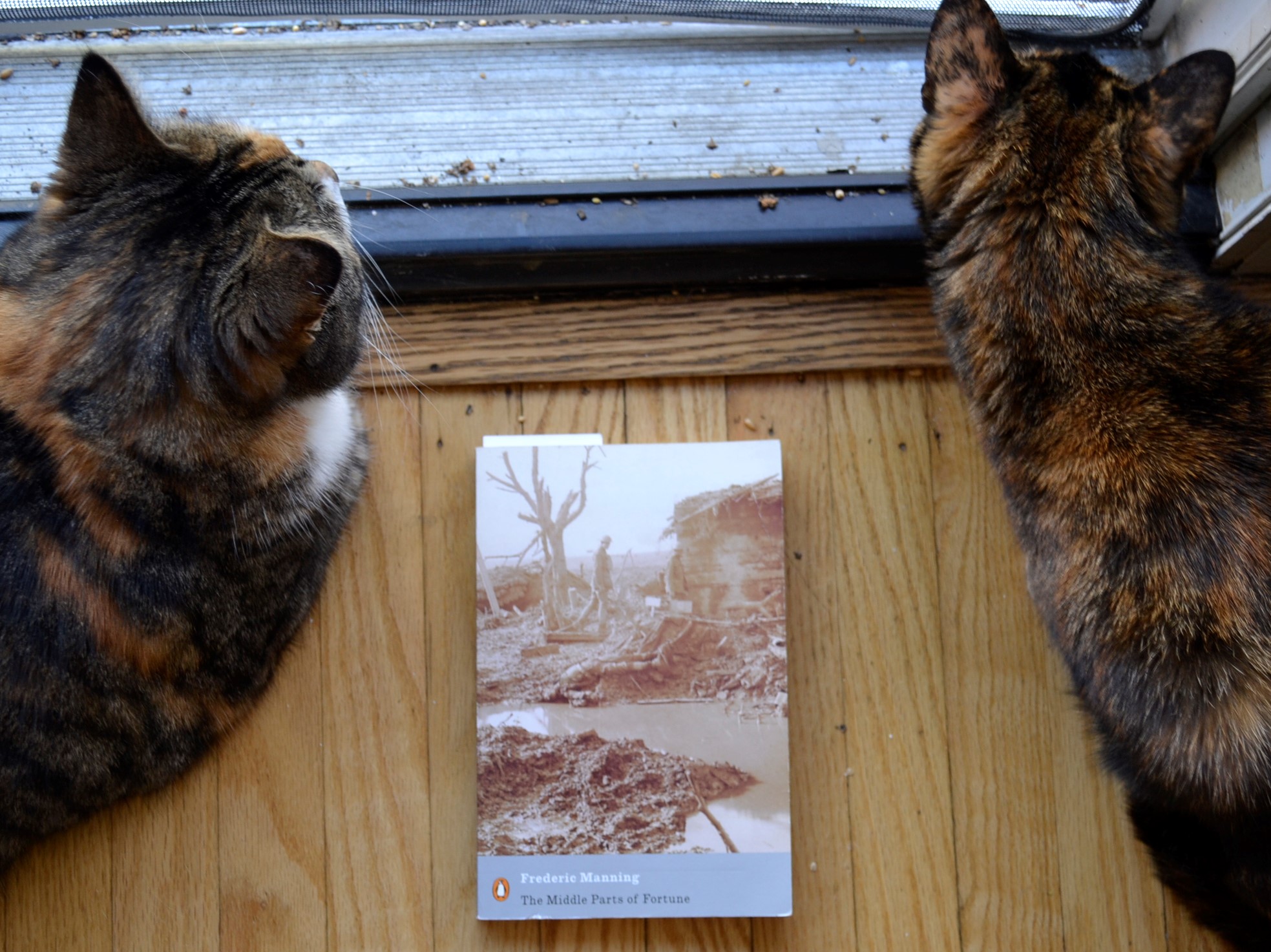Vacation’s End
So, this week has been an absolute whirlwind because we finally got some time off from most of work. But some work still poked a few holes through the idea of an absolute vacation and, of course, once you’ve spent several months in the work crucible, it is very hard to suddenly slow down. Honestly, it felt like half of the week went to just trying to be mindful and breathe through my brain trying to rush through every task.
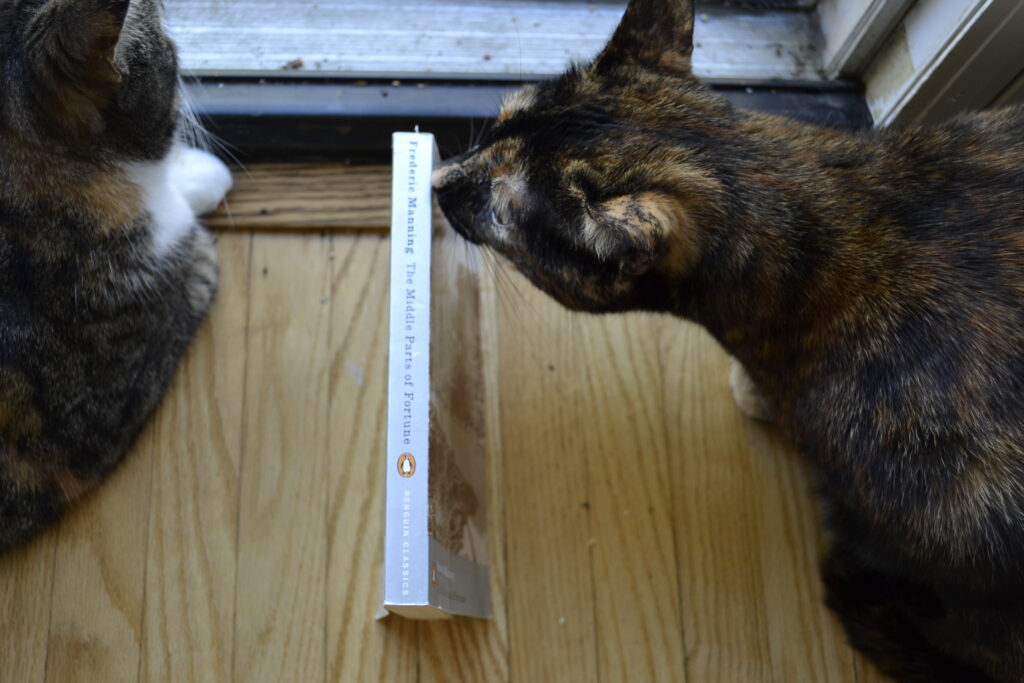
However, as the week of vacation ends, I do feel that I’m in a much better place. Less crushed. Less on the verge of burn out. More mentally ready to deal with the realities of the next few weeks and the holiday rush. It’s important to accept that there will be stressful days but that feeling doesn’t last forever and there are a lot more days that will be calmer and slower.
Just keep going. No feeling is final.
A Novel of World War I
The Middle Parts of Fortune was published anonymously in 1929, only to be censored and re-issued as Her Privates We in 1930. I have the original version in a Penguin Classics edition published in 2000. I’m always on the lookout for good fiction around WWI, so I was excited to find this book on one of our trips to a small used bookstore for my birthday a few months ago.
I found Manning’s writing to be thorough and very concerned with recording the experience of the English enlisted soldier in the trenches of World War I. He doesn’t mince words and doesn’t add any excess sentiment or emotion to the events of the novel which follows a man named Bourne who is on the cusp of getting a commission whether he wants it or not. Manning talks about the death and the fear and the conditions that the soldiers deal with daily, but he also talks about the workings of the army and the boredom and class differences between the ranks.
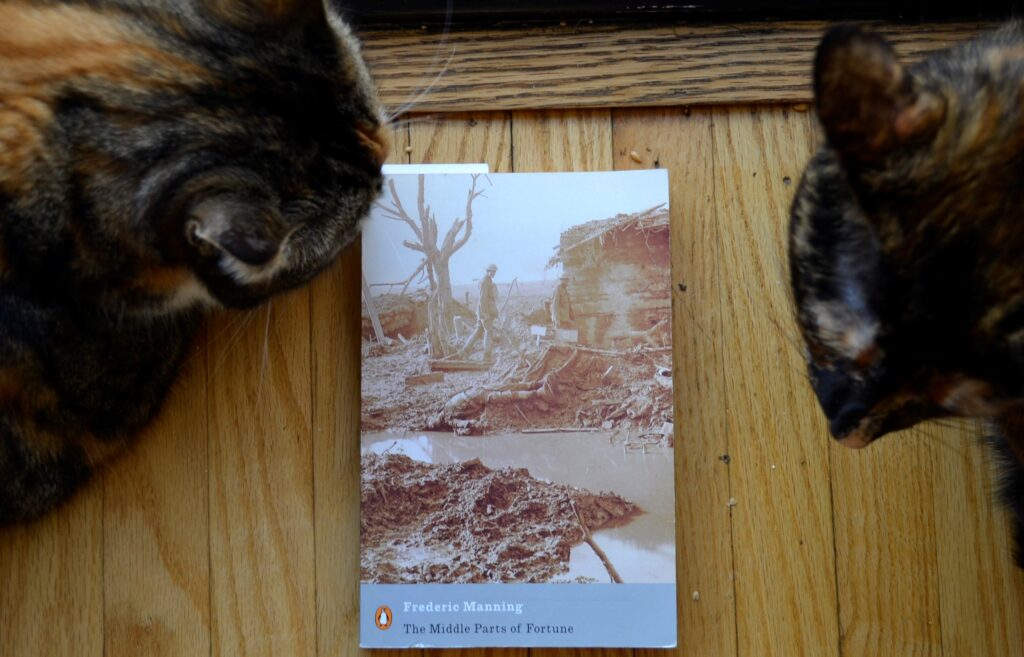
Some of these subjects I have seen covered in fiction before, but I haven’t before read a single novel that tries to touch on them all — especially one published prior to World War II. There’s a lot of great information that Manning provides to the reader, as well as immersing them in the realities and horror of war.
The Value of the Text
There’s no question that this text is valuable and worth the read. But I will say that there are aspects of it that make it a difficult read at the same time. Obviously, death is detailed graphically; that’s to be expected in war fiction. The issues I had with it were the blatant misogyny and the lack of emotional content.
Manning writes about women as if they are a separate species — one that is stupid, petty, and only there to serve men or incite their desire. Except if they’re older, then Manning proposes that their purpose is to cook. It’s very horrible and unpleasant to read, maybe more so because a lot of war fiction I have read in the past has had similar issues. War fiction seems by and large to be male-centric, ignoring the women that also took part in combat and supportive roles. I read a lot of male-centric narratives and that element in itself is not an issue — unless they start to insult, belittle, or otherwise make horrible statements about women or gender in general.
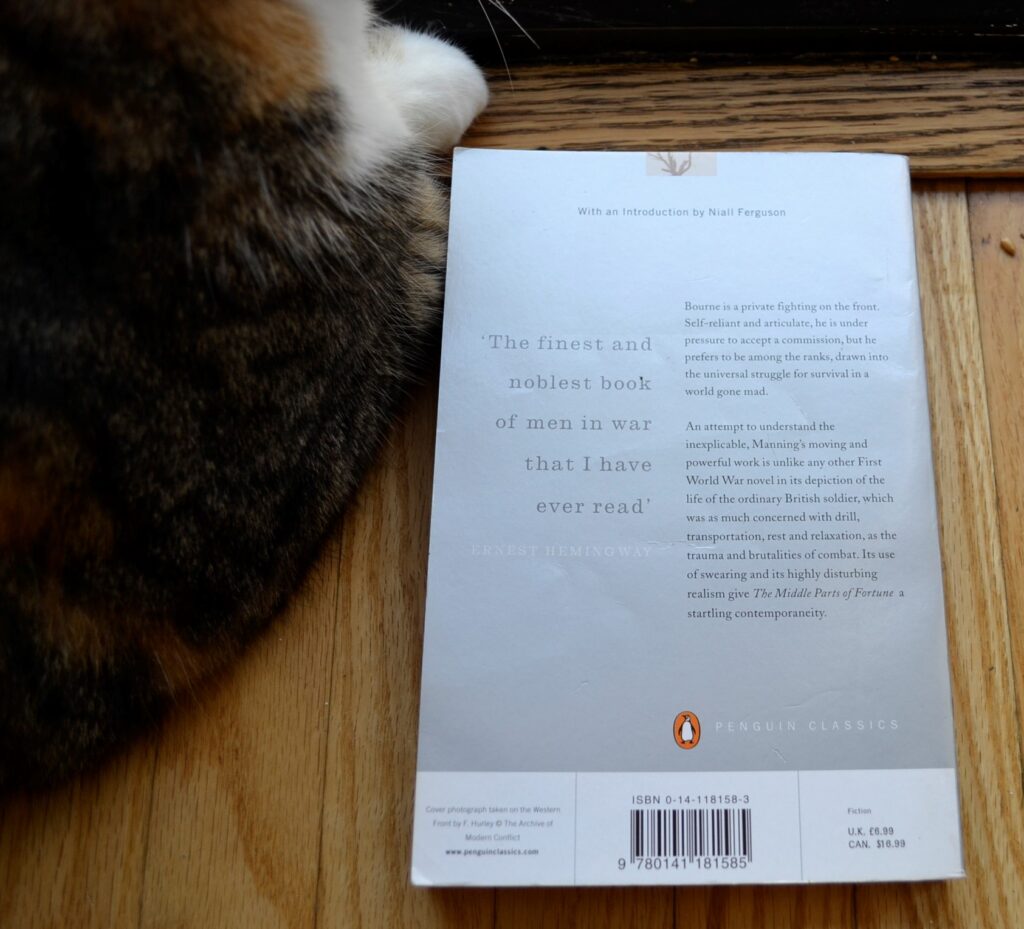
The lack of emotional content is also an issue. The novel is meant to avoid unnecessary sentiment, but it feels like Manning goes a few steps to far in pursuit of this goal. At the beginning of the book he details emotions attached to death, but Bourne always seems so far away from it. He is haunted by those that have died, but he doesn’t seem to grieve over them. He is said to experience fear, but doesn’t seem to at the same time. He always seems very removed from the events around him and the soldiers that he is supposed to be close to. It can make for a narrative that is a bit too stark at times and comes across as cold rather than stoic.
Another thing to note is that Manning did eventually become an officer and so he is a bit biased when it comes to defending their actions and their attitude towards the men under their command.
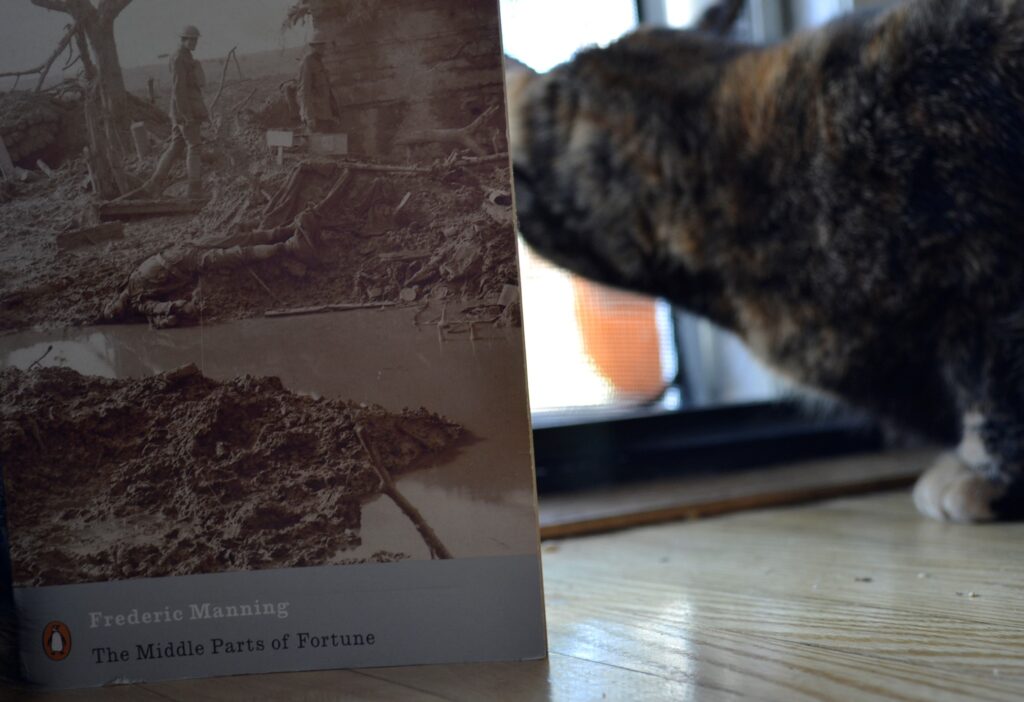
Does all this mean I wouldn’t recommend the novel? No. I think if you want to read about the First World War, this novel is a great choice — as long as you’re aware of when it was written and look at the content critically. There’s a lot of value in the novel as a historical document and a piece of fiction produced with the firsthand experience of the author.
Pacing
Content issues aside, this novel is also difficult to read due to some pacing issues. There are times where the text moves so quickly that it’s compelling, but often this momentum is dissipated by suddenly hitting a wall of description and slow scenes with more introspection. It makes it hard for a reader to keep going for long periods of time. Sadly, it’s an easy issue to fix, but in my research I discovered that Manning didn’t do a lot of editing or revising and wrote this novel to take advantage of a zeitgeist fiction trend.
Pacing might seem like such a small issue, but it’s not small when it comes to the reader’s experience and whether the novel actually gets finished or abandoned part of the way through.
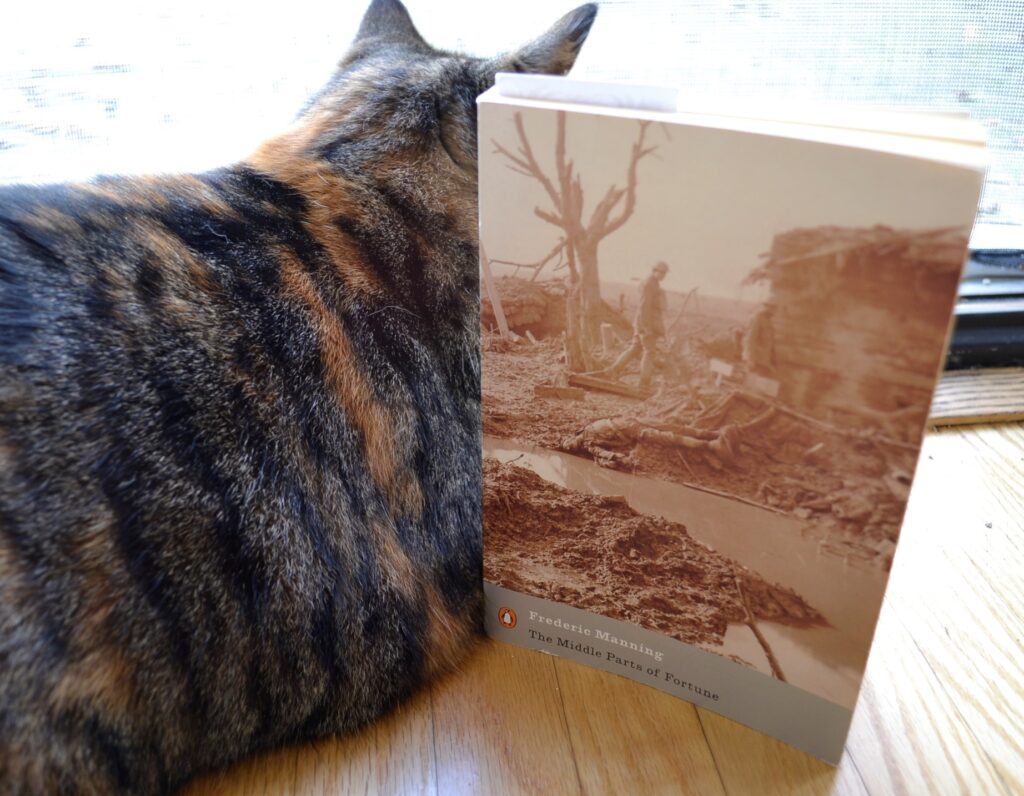
Cold Days Waiting for Snow
We’ve got a teeny bit of snow, but it was quick to disappear so now we’re smack dab in the middle of a lot of dark days where the clouds look full of either snow or freezing rain. Even the birds have been scarce as all the backyard wildlife tries to keep warm and prepare for the harsher weather.
I like these days almost as much as I like the snow, even if as I write this at two o’clock in the afternoon I’m sitting in the darkness of at least five or six o’clock at night.
Next week I’ll be discussing a text from the 18th century that is a rare non-fiction selection. Don’t miss it!
